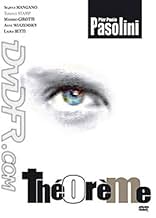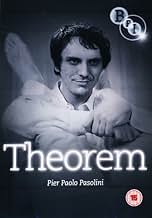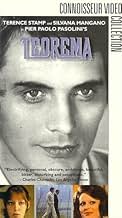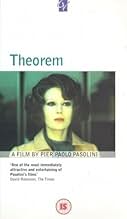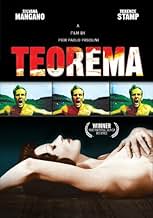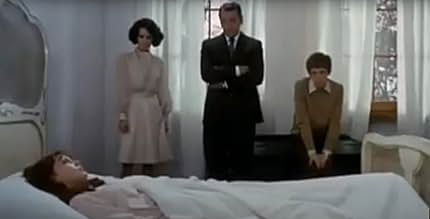Ein mysteriöser junger Mann verführt jedes Mitglied einer bürgerlichen Familie. Wenn er plötzlich geht, wie wird sich ihr Leben verändern?Ein mysteriöser junger Mann verführt jedes Mitglied einer bürgerlichen Familie. Wenn er plötzlich geht, wie wird sich ihr Leben verändern?Ein mysteriöser junger Mann verführt jedes Mitglied einer bürgerlichen Familie. Wenn er plötzlich geht, wie wird sich ihr Leben verändern?
- Regie
- Drehbuch
- Hauptbesetzung
- Auszeichnungen
- 1 Gewinn & 5 Nominierungen insgesamt
- Second Boy
- (as Ivan Scratuglia)
- Interviewer
- (Nicht genannt)
- Old Peasant
- (Nicht genannt)
Empfohlene Bewertungen
A beautiful and enigmatic visitor (a young Terence Stamp, one of the intriguing, almost androgynous cult sex figures of the 60's, along the lines of a Udo Kier and others) seduces and then leaves each member of a bourgeois family. The father (Massimo Girotti, of Visconti's "Ossessione"), the mother (Silvana Mangano, "Death in Venice"), the daughter (Anne Wiazemsky, of Bresson's "Au Hasard Balthazar" and Godard's then wife), the son (Andrés José Cruz Soublette) and even the housemaid (Laura Betti, best actress at the Venice Film Festival for this performance) are all altered by the visitor's sexual presence in their lives, and each will try to find salvation or catharsis once they're abandoned. Their ways can be seen as an allegory of the fears and misconceptions of those trapped in their own conventions, and the tragic consequences of their failed attempts to get away - after the visitor, an hedonistic angel of death, tricked them with false hopes of sexual and emotional liberation. At least, that's how I see it - which I wouldn't dare to claim as an ultimate view on it. As enigmatic and haunting the images in "Teorema" are, they ask for repeated viewings. And just the fact that they give you enough interest for a second look, it's quite a feat. An interesting, cerebral cinematic exercise, to say the least. 8.5/10.
Yes, there is a fable here, a mysterious man upsets balances in a bourgeois household. Yes, it is from those times -Bunueltimes, Godardtimes- when the word 'bourgeois' was meant quite vehemently. It is symbolically abstruse throughout about empty lives and the quest for meaning.
But, I think as with these people depicted on desperate journeys to fulfillment, the more you cling to the search for meaning as a viewer and try to boil it down to something that makes sense, the more you end up with just an allegory about the failure to do it. For all I know, that was Pasolini's intention, echoed loudly in the parting cry for god in the wilderness.
No matter. Me and him mean wholly different things by emptiness. What captivates me here is the free form of the narrative, the cinematic eye that places you as transparent observer in the same world as these people, not easy to accomplish this at all, and the journey through cracks of story to the wondrous emptiness of everything (trees, sunlight, concrete, people) languidly floating in space together.
It is in the same direction as Antonioni, though hampered by allegory. It invigorates the senses like he does. And the eye is tuned to the same architecture of empty space as seen in L'Eclisse and Blowup.
Pasolini may have meant this as lament or indictment. I get the same melancholy joy as from Japanese woodblocks.
Wusstest du schon
- WissenswertesAt the 1968 Venice Film Festival, the film was given an award by the International Catholic Film Office. The award was withdrawn after critical remarks by Pope Paul VI. After the festival the film was confiscated by Italian police and Pier Paolo Pasolini charged with obscenity, but acquitted.
- PatzerAfter literally rolling around in a ditch with some kid she picked up on the street, the mother's designer suit remains clean and pressed.
- Zitate
Lucia, the mother: I realize now that I've never had any real interest in anything. I don't mean anything grand. Just the simple, everyday interest my husband takes in his work, or my son in his studies, or Odetta in family life. I've had nothing like that. I don't know how I lived with such emptiness, yet I did. If there was anything at all, some instinctive love of life, it has withering away - like a garden where no one ever goes. Actually, that void was filled with false and wretched values, an appalling jumble of misguided ideas. Now I see: You filled my life with a real and total interest. So by leaving, you're not destroying anything that was there before, except my chaste bourgeois reputation. Who cares about that?
- VerbindungenEdited into Geschichte(n) des Kinos: Seul le cinéma (1994)
- SoundtracksRequiem
KV 626
Written by Wolfgang Amadeus Mozart
Performed by Russian Academy Choir and Moscow Philharmonic Orchestra
Courtesy of MK Records
Top-Auswahl
- How long is Teorema?Powered by Alexa
Details
- Erscheinungsdatum
- Herkunftsland
- Sprachen
- Auch bekannt als
- Teorema
- Drehorte
- 16 Via Palatino, Milan, Lombardia, Italien(family house)
- Produktionsfirmen
- Weitere beteiligte Unternehmen bei IMDbPro anzeigen
- Laufzeit1 Stunde 37 Minuten
- Farbe
- Seitenverhältnis
- 1.85 : 1
Zu dieser Seite beitragen




